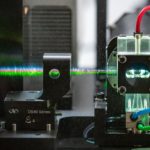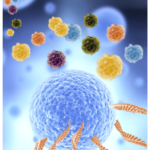Link to Pubmed [PMID] – 21967768
J. Exp. Med. 2011 Oct;208(11):2225-36
The role of the IgE-FcεRI complex in malaria severity in Plasmodium falciparum-hosting patients is unknown. We demonstrate that mice genetically deficient for the high-affinity receptor for IgE (FcεRIα-KO) or for IgE (IgE-KO) are less susceptible to experimental cerebral malaria (ECM) after infection with Plasmodium berghei (PbANKA). Mast cells and basophils, which are the classical IgE-expressing effector cells, are not involved in disease as mast cell-deficient and basophil-depleted mice developed a disease similar to wild-type mice. However, we show the emergence of an FcεRI(+) neutrophil population, which is not observed in mice hosting a non-ECM-inducing PbNK65 parasite strain. Depletion of this FcεRI(+) neutrophil population prevents ECM, whereas transfer of this population into FcεRIα-KO mice restores ECM susceptibility. FcεRI(+) neutrophils preferentially home to the brain and induce elevated levels of proinflammatory cytokines. These data define a new pathogenic mechanism of ECM and implicate an FcεRI-expressing neutrophil subpopulation in malaria disease severity.





